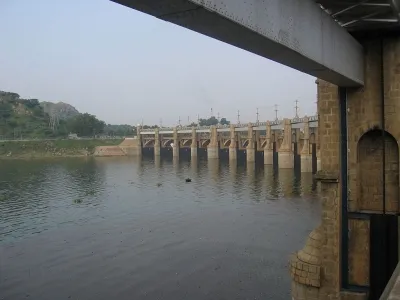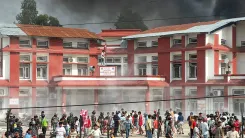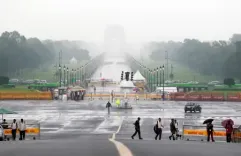Are TN Farmers Worried About Slow Desilting Before Mettur Dam Water Release?

Synopsis
Key Takeaways
- Farmers voice concerns over slow desilting.
- Only 40-50% of desilting work completed.
- Political favoritism alleged in resource allocation.
- Urgency increases as Kuruvai season approaches.
- Farmers demand transparency and accountability.
Chennai, June 2 (NationPress) With merely ten days remaining until the planned water release from the Mettur dam on June 12, farmers in Tamil Nadu's Cauvery Delta have voiced serious concerns regarding the sluggish and inconsistent pace of desilting activities, which are vital for optimal water distribution during the Kuruvai cultivation season.
Local farmer associations estimate that only about 40 to 50 percent of the desilting efforts have been accomplished so far. Farmers claim that the work is being executed in a biased manner, prioritizing regions with political ties while ignoring essential irrigation channels.
“It appears that officials are more focused on meeting political pressures rather than addressing the real needs in the field,” stated Eraharam Swaminathan, president of the Pazhavaru Ayakattar Association. “Several C to G category channels have been overlooked under the guise of insufficient funding, even though these are crucial for countless small farmers.”
He highlighted the Kandagarayam canal in Thanjavur, a B-category irrigation channel, as a prime example of bureaucratic negligence. “It hasn’t seen desilting in five years, despite servicing over 1,500 acres,” he remarked.
In light of the growing criticism, an anonymous official from the Water Resources Department (WRD) acknowledged the issues but defended their ongoing efforts.
“Desilting is being conducted in phases with priority based on command area size and available budget. We aim to cover as much ground as possible before June 12,” the official affirmed.
Nonetheless, farmers remain skeptical. “In areas like Ammaiyagaram, the quality of work is subpar,” remarked A.R. Manikantan, a farmer leader. “Contractors are receiving payments before finishing the job, leading to poor outcomes. We require transparency and accountability.”
When approached, Thanjavur District Collector Dinesh Ponraj Oliver stated that regular inspections are ongoing. “We have instructed all field engineers to expedite their efforts. We’re cooperating with the WRD to ensure that major irrigation channels are desilted prior to the Mettur release,” he mentioned.
However, farmers have warned of potential protests if conditions do not improve. “We are not asking for favors — we’re demanding timely action to protect our livelihoods,” declared Swaminathan.
As the Kuruvai season approaches, the need for completed desilting has become urgent across the Delta. Farmers are urging the state government to step in and ensure fair and efficient desilting before the water is released.







